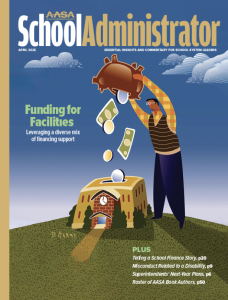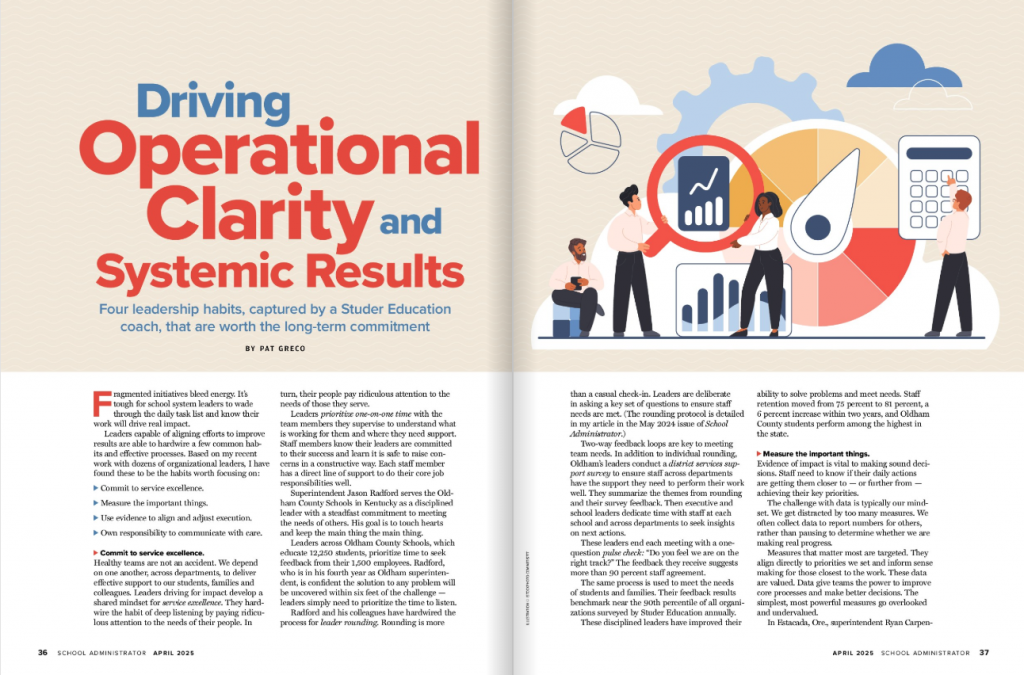Adam Leckie, superintendent in Casa Grande, Ariz., involves staff, students and family in constant feedback processes for the school district. | Photo from AASA’s School Administrator Magazine: April 2025 and courtesy of Casa Grande Elementary School District.
From Clarity to Results: Four Leadership Habits That Transform School Systems
In the April 2025 issue of School Administrator, Studer Education Leader Coach and Senior Director of Thought Leadership Dr. Pat Greco delivers a clear message to school system leaders: Fragmented initiatives drain energy. Leaders who drive improvement don’t chase initiatives—they hardwire aligned habits that create real results.
Driving Operational Clarity and Systemic Results: Four Leadership Habits That Make a Difference
In her article for School Administrator, Dr. Pat Greco outlines four leadership habits that drive systemic improvement in school districts: committing to service excellence, measuring what matters, using evidence to adjust execution, and communicating with care. She highlights how districts like Oldham County (KY), Estacada (OR), El Dorado County (CA), and Casa Grande (AZ) have embedded these habits to align efforts, build strong teams, and achieve real results. Dr. Greco emphasizes that sustainable improvement comes from disciplined leadership and intentional processes—not from chasing initiatives.
Drawing on her work with district leaders across the country, Dr. Greco highlights four leadership habits that deliver systemic, sustainable results:
Commit to Service Excellence
Healthy teams don’t happen by accident. Leaders who hardwire service excellence make deep listening a core habit—intentionally seeking and acting on feedback.
In Oldham County Schools, KY, Superintendent Jason Radford and his team round consistently with staff, conduct service support surveys, and host feedback meetings at every school and department. As Dr. Greco notes, “The solution to any problem will be uncovered within six feet of the challenge—leaders simply need to prioritize the time to listen.”
Measure the Important Things
Leaders get distracted by too much data. But the most effective ones measure a few targeted, aligned metrics—and they pause regularly to assess progress and make adjustments.
In Estacada School District, OR, Superintendent Ryan Carpenter and his team moved from the bottom of state rankings to one of Oregon’s “Best Places to Work.” Their key? A systemwide scorecard that tracks measures like student attendance, assignment completion, and operational response time. These leading indicators help predict student achievement and guide the next actions.
Use Evidence to Align and Adjust Execution
It’s not enough to set goals—leaders must revisit them regularly and adjust based on real data. That’s how systems improve.
El Dorado County Office of Education, CA, serving 24,000 students across 15 districts, uses a 90-day reflection cycle that includes leader huddles, department debriefs, and progress updates twice a year. Their evidence-based approach has improved attendance, hiring, onboarding, billing, and more—all while supporting the students furthest from privilege.
Communicate with Care
Despite its importance, communication often falls short. The best leaders hardwire feedback loops and ensure staff understand not just what they’re doing—but why it matters.
In Casa Grande Elementary School District, AZ, Superintendent Adam Leckie launched the year with a town hall that connected every staff member to the district’s shared priorities. Weekly pulse-checks, video messages, newsletters, and team huddles keep the feedback flowing and the alignment strong.
A Shared Commitment to Excellence
As Dr. Greco writes, “We cannot chase our way to improvement.” Instead, the disciplined leadership habits modeled in Oldham County, Estacada, El Dorado County, and Casa Grande show what’s possible when teams work together to align their habits, communicate clearly, and use evidence to make progress.
When districts hardwire service, data use, intentional reflection, and strong communication, they create the conditions for long-term success.
-
Pat Greco Senior Director of Thought Leadership
 School Administrator magazine
School Administrator magazine
This issue examines the financing of school facilities, the optimizing of school bus routing and other facets of school district operations.
Read More >>
Learn More: Podcast Episodes on Hardwiring Leadership Habits
For real-world insights from education leaders who are hardwiring service excellence, aligning goals, and using evidence to drive improvement, explore these episodes of the Accelerate Your Performance podcast. You’ll hear how education leaders build systems that create clarity, strengthen teams, and deliver results.
Rounding for Service Excellence
Superintendent Dr. Jason Radford shares how Oldham County Schools uses a rounding road show to gather input from all 1,500 employees, strengthening district culture and improving service excellence satisfaction.
Enhance Communication with Scorecards and Huddles
Dr. Ryan Carpenter shares how daily huddles and scorecards in Estacada School District strengthen two-way communication, build team culture, and drive alignment with strategic goals.
How Short Cycles of Improvement Drive Change
Dr. Ed Manansala discusses how El Dorado County Office of Education uses short cycles of improvement to drive change and enhance processes across multiple departments, sharing insights on how this approach leads to team success.






